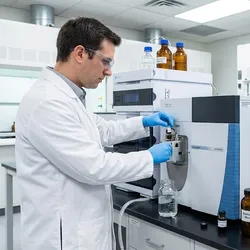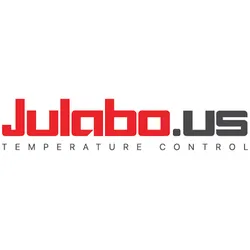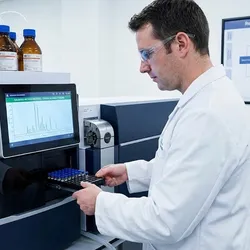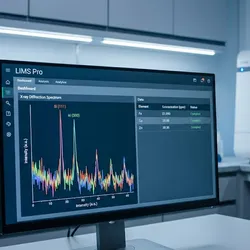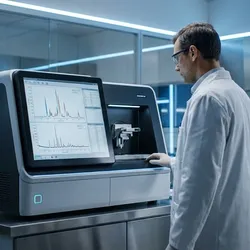Contract research and testing laboratories are under constant pressure to meet client expectations while also keeping up to date on regulatory changes and managing multiple projects and costs. A robust laboratory information management system (LIMS) is essential to effectively manage contract testing, whether in-house or outsourced. It enables labs to deliver accurate, reproducible data faster, with detailed reporting and configuration options. The right informatics solution can help laboratories overcome several key operational challenges and support the organization’s growth.
Challenge: Meeting increasing demand and client expectations
Faster turnaround times can give a lab an edge in an increasingly competitive marketplace. Labs that have streamlined, efficient workflows and reporting methods are better able to respond to client needs quickly. This allows them to stand out by prioritizing both speed and quality for their clients.
Businesses are also evolving and becoming more agile, and labs are adopting advanced technologies including automation, artificial intelligence, and cloud computing. As a result, clients expect real-time status updates on analyses and projects. Labs that meet these new expectations can positively impact a client’s ability to make decisions and remain competitive within their own industries and markets.
Solution: Enhanced LIMS for greater efficiency
An enhanced LIMS has several capabilities that can help labs achieve faster turnaround times. For example, reporting takes a considerable amount of time and is still subject to human error. A LIMS that supports automatic data capture throughout testing accelerates the time it takes to complete reporting while also reducing errors. Resource management is a time-consuming endeavor that can also be addressed with a comprehensive LIMS. By choosing a LIMS solution with resource management capabilities, labs can alleviate staff from having to manually manage this task, help to control costs, and ensure supplies and reagents are stocked to prevent detrimental delays.
To meet client needs with quicker turnaround times, labs require a high degree of flexibility and efficiency. A quality LIMS must equip labs to quickly adapt processes and create configurable workflows. Additionally, an advanced LIMS platform allows clients to communicate quickly and easily with clients, submit requests, and access real-time results. This capability has the added benefit of eliminating time spent creating and sending reports and will be a true asset for the future of digital labs.
Challenge: Pressure to enhance productivity
Some of the pressure-inducing factors that contract research and testing labs face include increasing competition among labs, higher expectations from clients, regulatory pressure, and high-throughput tools and technologies. In the life sciences industry, there is demand for faster time-to-market, and in the clinical space, trials are becoming increasingly complex (incorporating sophisticated methods, multiple sites, etc.).
Solution: Standardization and collaboration across projects and laboratories
It is crucial to centralize data management to facilitate standardization and collaboration across different departments and locations. Consistently storing and accessing data reduces data silos and inconsistencies. An advanced LIMS centralizes all lab data and makes it easily accessible from a single platform, eliminating fragmented data across multiple systems. By enforcing standardized data entry and reporting formats, a robust LIMS ensures consistency and makes it easy to aggregate and analyze data from various sources.
To bolster collaboration across numerous lab functions, an informatics platform designed to integrate with the numerous instruments and systems in the lab can further streamline communication and facilitate data sharing. Successful collaboration also necessitates standardized methods, processes, and procedures. Some degree of flexibility for customization is also important. This allows labs to tailor standard practices and attract clients with unique needs for their projects.
Furthermore, collaboration can be improved with accessibility and transparency extending to clients and external partners. A web portal is a valuable feature that improves overall communication and productivity and empowers clients and partners to submit requests and access results with a consistent approach.

iStock, PeopleImages
Challenge: Meeting quality and compliance standards
Contract laboratories working with clients in regulated industries—particularly within life sciences—must have confidence in their ability to meet complex and stringent quality and compliance standards. Their clients must be able to trust that the data is accurate, reliable, and reproducible. Building this trust also helps labs build their reputation to attract long-term clients and build relationships for repeat business.
Achieving these objectives requires meticulous recordkeeping, ensuring processes are traceable, auditable, and compliant with regulatory standards. Without a comprehensive informatics platform, lab staff must dedicate considerable time and effort to manual documentation tasks. This can result in increased operational costs and the potential for human error.
Solution: Automate data collection throughout the research/testing lifecycle
A robust LIMS platform that automates data capture and operating procedures provides full traceability and ensures data accuracy and reliability by eliminating human error. Automation also alleviates the burden of documentation on skilled lab staff, freeing up their time for core and complex operations.
Moreover, a platform that automates compliance processes and maintains rigorous quality standards helps meet diverse requirements across many industries. These include:
- Laboratory standards (ISO 17025 and ISO 15189 specific to medical labs)
- Medical device standards (ISO 13485 and 21 CFR Part 820)
- Manufacturing and production standards (Good Manufacturing Practice (GMP) relevant to pharmaceuticals, food production, cosmetics, and medical devices)
- Regulatory compliance for electronic records (21 CFR Part 11 particularly relevant in pharmaceuticals and medical devices)
Integrating these compliance processes into a LIMS platform enables labs to improve efficiency and build trust with their clients by consistently delivering high-quality, reliable data.
Challenge: Enhancing cost efficiency and simultaneously driving growth
Several challenges related to costs and growth impact lab operations. A primary concern is managing operational costs, which encompasses technology and infrastructure as well as recruiting, retaining, and managing skilled personnel. Ensuring these individuals have the time to focus on critical lab tasks, as opposed to manual documentation and recordkeeping, is critical to maintaining/increasing productivity and efficiency.
Another concern is whether labs are scalable. Scalability poses challenges as labs rapidly grow and expand across multiple sites. Rapid expansion can strain existing systems and create additional costs to meet increased demand for services. For labs that operate sites across multiple regions or countries, regulatory variability increases operational complexity and costs. Ensuring consistent data quality during phases of growth poses an additional challenge. Variations in processes and protocols within and across labs can threaten the reliability of results.
Solution: Flexible, scalable, and cost-effective software solutions
With a flexible, scalable Software as a Service (SaaS) solution, labs can easily scale up or down based on demand. This approach minimizes costs related to excess infrastructure and personnel and reduces the need for on-site hardware and IT support, lowering the total cost of ownership. Informatics solutions tailored to support high testing volumes and complex processes can further enhance scalability without compromising efficiency or incurring additional costs.
Centralized data management is another advantage of the SaaS model, as it eliminates data silos and reduces redundant data entry and storage. This reduces administrative overhead and operational costs. Additional features such as automated compliance capabilities help mitigate manual effort and reduce the risk of compliance issues and associated penalties. Standardization within the system ensures reliable, high-quality results while facilitating method and project customization to meet unique client needs.
A LIMS solution that supports scaling up from single- to multi-site operations while maintaining consistent processes and robust data management can help drive growth while mitigating costs.
Introducing an advanced LIMS, cloud-based SaaS deployment model
In an increasingly competitive landscape, contract research and testing labs are under constant pressure to deliver accurate, reliable results while adapting to changing demands and market conditions. Clinisys™ Contract Services Laboratory™ is an advanced, comprehensive LIMS solution with a cloud-based SaaS deployment model designed to help labs overcome these challenges.
This powerful solution supports integrated workflow management, facilitating sample tracking, data management, and reporting. Automated data capture throughout the research or testing lifecycle enables labs to gather data for full traceability and audit for compliance against national and international regulations—while alleviating skilled laboratory personnel of this tedious and error-prone task.
With real-time data access, labs can monitor progress and track samples to support quick, informed decision-making. A unique web portal facilitates communication with clients and overall efficiency. Moreover, the platform easily integrates with other systems and instruments to facilitate scale-up or scale-down based on changing demands. Leveraging an advanced LIMS, such as the Clinisys Contract Services Laboratory™, allows labs to streamline operations, adapt to market changes, and position themselves for sustainable growth in a competitive landscape.
To learn more, visit www.clinisys.com







